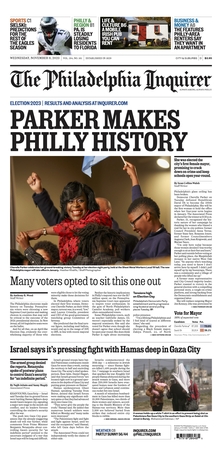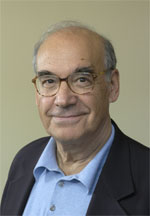Related Research Articles

The Philadelphia Inquirer, often referred to simply as The Inquirer, is a daily newspaper headquartered in Philadelphia, Pennsylvania. Founded on June 1, 1829, The Philadelphia Inquirer is the third-longest continuously operating daily newspaper in the United States.

The Medill School of Journalism is the journalism school of Northwestern University. It offers both undergraduate and graduate programs. It once ranked as one of the top schools of journalism in the United States. Medill alumni include over 40 Pulitzer Prize laureates, numerous national correspondents for major networks, many well-known reporters, columnists and media executives. Founded in 1921, it is named for publisher and editor Joseph Medill.

The Pulitzer Prize for Public Service is one of the fourteen American Pulitzer Prizes annually awarded for journalism. It recognizes a distinguished example of meritorious public service by a newspaper or news site through the use of its journalistic resources, which may include editorials, cartoons, photographs, graphics, video and other online material, and may be presented in print or online or both.
Richard Read is a freelance reporter based in Seattle, where he was a national reporter and bureau chief for the Los Angeles Times from 2019 to 2021. A two-time Pulitzer Prize winner, he was a senior writer and foreign correspondent for The Oregonian, working for the Portland, Oregon newspaper from 1981 to 1986 and 1989 until 2016.

Ralph Emerson McGill was an American journalist and editorialist. An anti-segregationist editor, he published the Atlanta Constitution newspaper. He was a member of the Peabody Awards Board of Jurors, serving from 1945 to 1968. He won a Pulitzer Prize for editorial writing in 1959.
The Pulitzer Prizes for 1981 were announced on April 13, 1981.
Hazel Freeman Smith was an American journalist and publisher, the owner and editor of four weekly newspapers in rural Mississippi, mostly in Holmes County. Her newspapers included the Lexington Advertiser, the second oldest newspaper in the state. She distinguished herself both in reporting and editorial writing, advocating for justice for African Americans in the county and the state.
Wendell Lee Rawls Jr. is a Pulitzer Prize-winning investigative reporter and editor. His career spans 40 years in journalism and media, beginning in 1967 at The (Nashville) Tennessean.
The following are the Pulitzer Prizes for 1987.
Homer William Bigart was an American reporter who worked for the New York Herald Tribune from 1929 to 1955 and for The New York Times from 1955 to his retirement in 1972. He was considered a "reporter's reporter" and an "enduring role model." He won two Pulitzer Prizes as a war correspondent, as well as most of the other major journalism awards.

Harry Scott Ashmore was an American journalist who won a Pulitzer Prize for his editorials in 1957 on the school integration conflict in Little Rock, Arkansas.
Donald Leon Barlett was an American investigative journalist and author who often collaborated with James B. Steele. According to The Washington Journalism Review, they were a better investigative reporting team than even Bob Woodward and Carl Bernstein. Together they won two Pulitzer Prizes, two National Magazine Awards and six George Polk Awards. In addition, they have been recognized by their peers with awards from Investigative Reporters and Editors on five separate occasions. They were known for their reporting technique of delving deep into documents and then, after what could be a long investigative period, interviewing the necessary sources. The duo worked together for over 40 years and is frequently referred to as Barlett and Steele.

Hank Klibanoff is an American journalist, now a professor at Emory University. He and Gene Roberts won the 2007 Pulitzer Prize for History for the book The Race Beat: The Press, the Civil Rights Struggle, and the Awakening of a Nation.
Claude Fox Sitton was an American newspaper reporter and editor. He worked for The New York Times during the 1950s and 1960s, known for his coverage of the civil rights movement. He went on to become national news director of the Times and then editor of The News & Observer in Raleigh, North Carolina.

Haynes Bonner Johnson was an American journalist, author, and television analyst. He reported on most of the major news stories of the latter half of the 20th century and was widely regarded as one of the top American political commentators.

The Race Beat: The Press, the Civil Rights Struggle, and the Awakening of a Nation is a 2006 nonfiction book by journalists Gene Roberts and Hank Klibanoff. The book is about the Civil Rights Movement in the United States, specifically about the role of newspapers and television. The Race Beat refers to reporters whose beat reporting covered issues of race.

John N. Herbers was an American journalist, author, editor, World War II veteran, and Pulitzer Prize finalist.
John Howard Nelson was an American journalist. He was praised for his coverage of the Watergate scandal, in particular, and he was described by New York Times editor Gene Roberts as "one of the most effective reporters in the civil rights era." He won a Pulitzer Prize in 1960.
Ray Sprigle was a journalist for the Pittsburgh Post-Gazette. He won a Pulitzer Prize in 1938 for his reporting that Alabama Senator Hugo Black, newly appointed to the US Supreme Court, had been a member of the 20th-century Ku Klux Klan.
Buried Truths is a history podcast hosted by Hank Klibanoff and produced by WABE, a radio station in Atlanta, Georgia.
References
- ↑ For birthdate and full name, Library of Congress Authorities cites Contemporary Authors, which may be derived from earlier LC CIP data.
- ↑ Shapiro, Michael (2007). "Heartbreak on Wheels: The Philadelphia Inquirer". In Charles M. Madigan (ed.). 30: The Collapse of the Great American Newspaper (Hardback). Chicago: Ivan R. Lee. p. 156. ISBN 978-1-56663-742-8.
- ↑ Cauchon, Dennis (August 1, 1990). "Roberts to leave 'Inquirer'". USA Today.
- ↑ Williams, Marjorie (August 1, 1990). "Philadelphia Inquirer's Top Editor Resigns". The Washington Post.
- ↑ https://www.pulitzer.org/winners/gene-roberts-and-hank-klibanoff
- ↑ Schultz, Will. "Gene Roberts (1932-)". NorthCarolinahistory.org: An Online Encyclopedia. Retrieved 2020-05-26.
- ↑ "The Pulitzer Prizes" . Retrieved 3 May 2011.
- ↑ "History". The Pulitzer Prizes. Retrieved 2013-11-05.
- ↑ "Golden Plate Awardees of the American Academy of Achievement". www.achievement.org. American Academy of Achievement.
- 1 2 "Eugene Roberts". N.C. Media & Journalism Hall of Fame. 1984. Retrieved 2020-05-26.
- ↑ Committee to Protect Journalists (CPJ) Board of Directors
- ↑ "Interview with Gene Roberts on JournalismJobs.com". Archived from the original on 2007-06-13. Retrieved 2007-04-22.